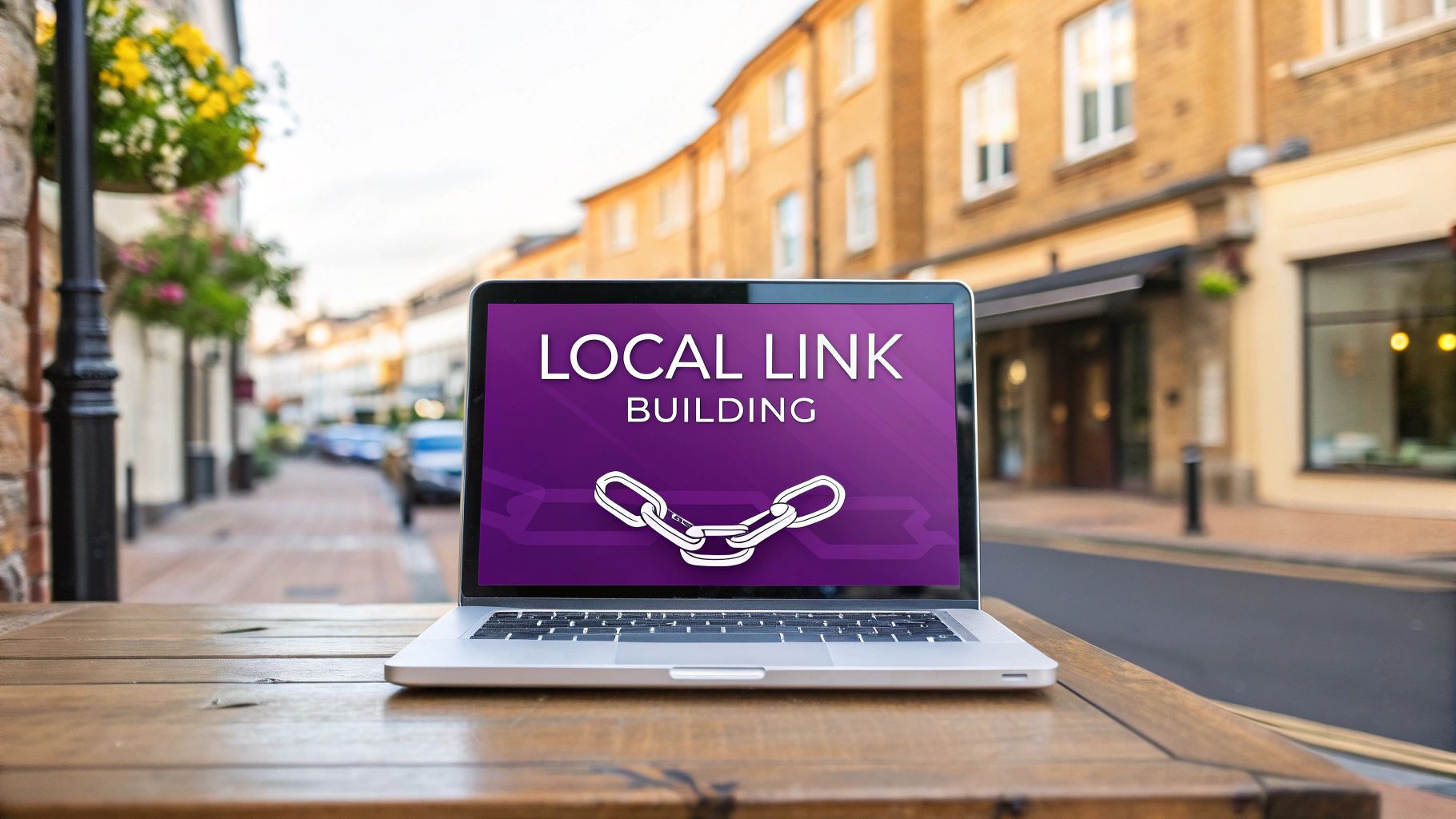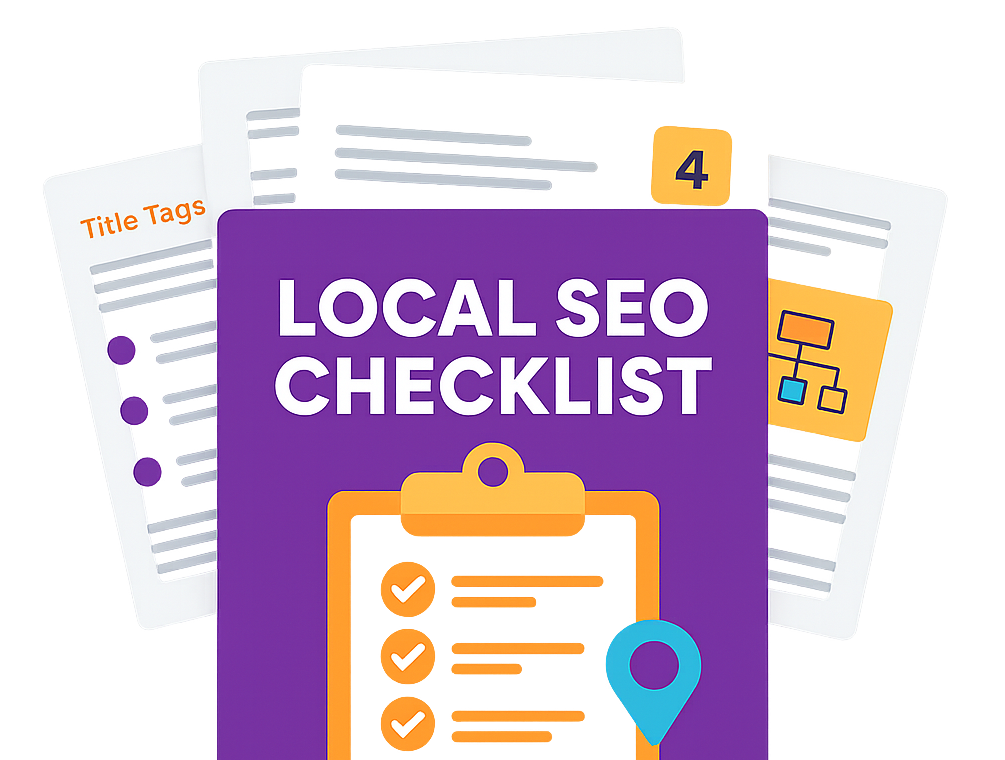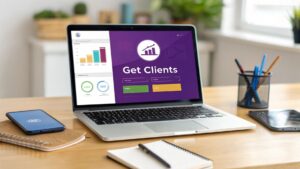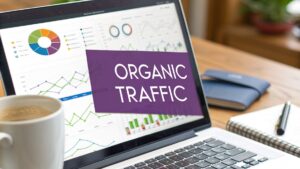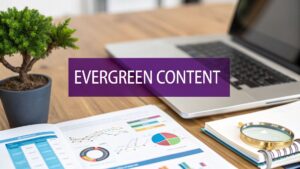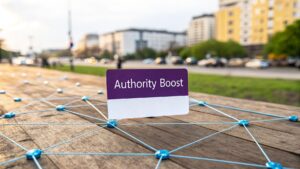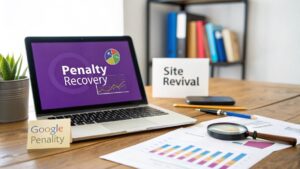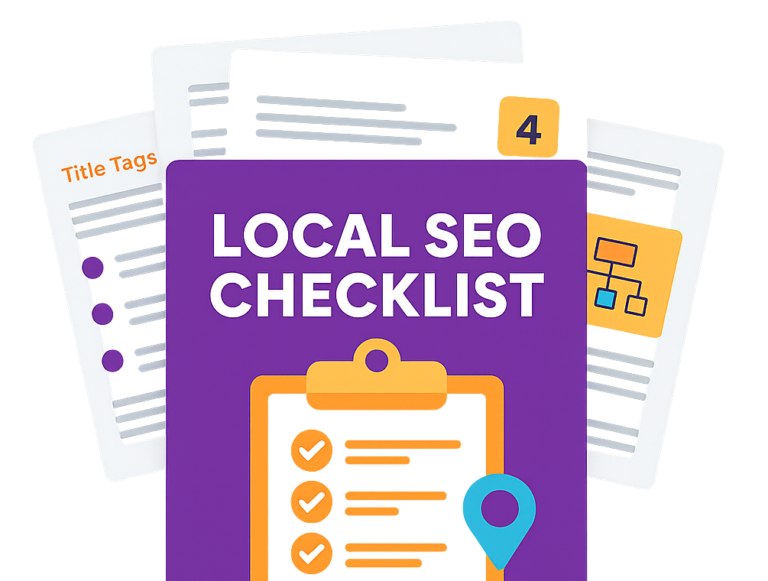Link building for a local business is all about getting hyperlinks from other relevant, local websites to point to yours. Think of these links as digital endorsements. They signal to search engines like Google that your business is a trusted, prominent part of the local community.
Getting this right directly boosts your visibility in local search results and Google Maps. Ultimately, it drives more nearby customers to your website and through your front door.
Why Local Links Are a Game Changer
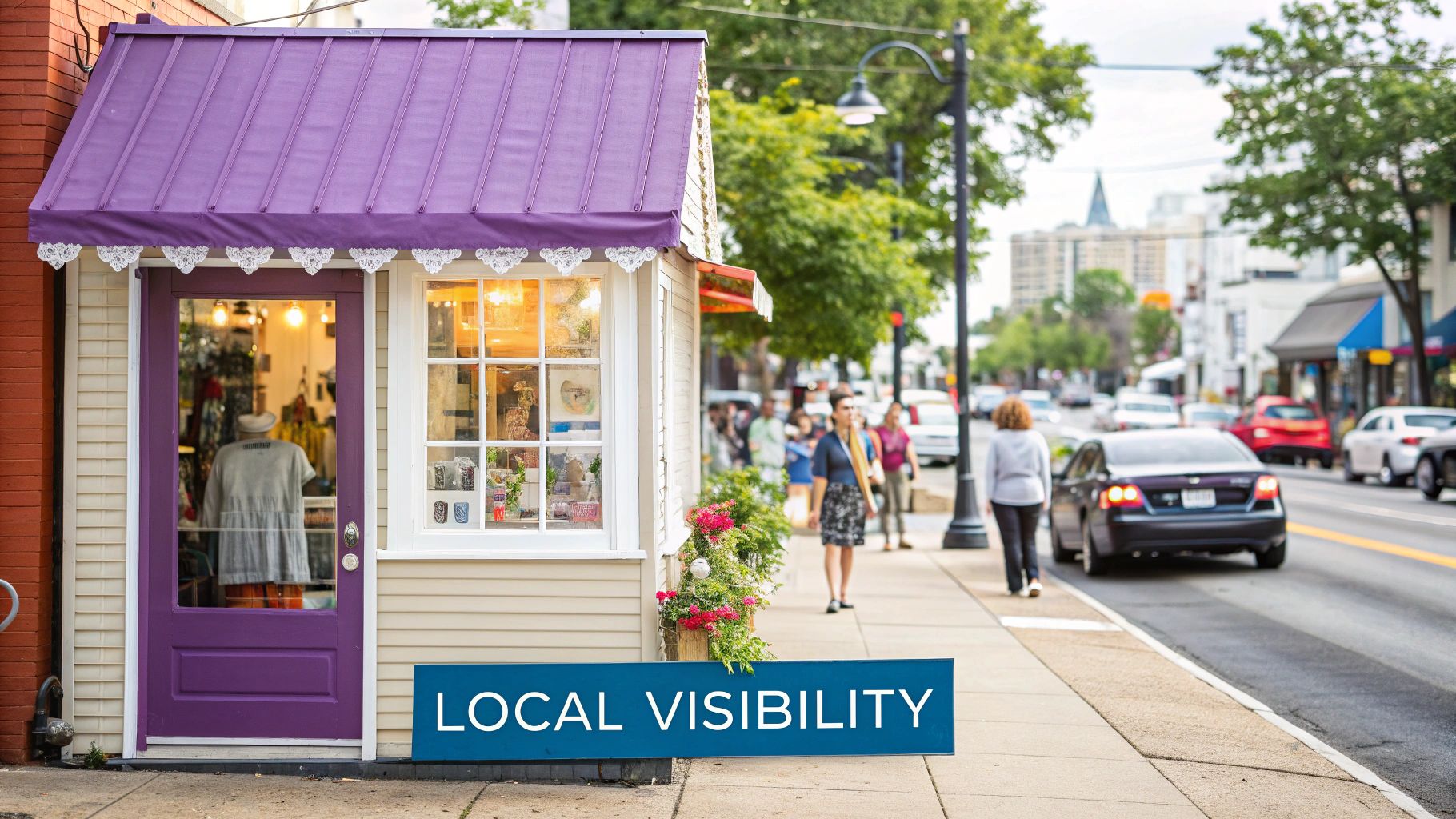
As a local business owner, your time is precious. Every bit of marketing effort has to count. Link building might sound like a bunch of technical jargon, but it’s really just about building digital relationships that pay off in the real world.
Put it this way: a link from a well-respected local newspaper or a popular community blog is a powerful vote of confidence in Google's eyes.
These "backlinks" are a fundamental signal that search engines use to figure out your business's credibility and relevance. When another local entity links to you, it tells Google you’re a legitimate and important player in the area. This has a direct impact on how high you appear for valuable searches like "plumber in Manchester" or "best cafe near me."
The Power of Local Relevance
The real key that separates general link building from local link building is geographic relevance. A link from a national newspaper is great, don't get me wrong. But a link from the Cambridgeshire Live news site is far more powerful if you're a Cambridge-based business. Search engines understand this context perfectly.
This hyper-local focus is what makes link building so effective for SMEs. It helps you punch above your weight and compete with larger, national brands by cementing your authority within a specific geographic area. Your goal is to build a profile of links that screams "local expert."
Tangible Business Benefits
Beyond just rankings, a solid local link building strategy delivers concrete advantages that actually impact your bottom line. It's always a good idea to start with an understanding general link building principles to get the foundations right.
Here are the main benefits you can expect to see:
- Increased Visibility in the 'Local Pack': High-quality local links are a massive factor in getting your business featured in the map results at the top of Google searches.
- More Foot Traffic: Higher rankings naturally lead to more people finding your physical location and getting directions through Google Maps.
- Targeted Website Visitors: People clicking through from a local blog or directory are already interested in what's happening in your area, making them highly qualified leads.
- Enhanced Brand Authority: Being featured on trusted local sites builds your reputation both online and offline, establishing you as a go-to leader in the community.
Building Your Foundational Local Links
Before you even think about chasing links from the local paper or sponsoring the village fete, you need to get your foundation right. Think of it like building a house – you wouldn’t dream of putting up the walls before the concrete base is properly set. In local SEO, these foundational links give Google the stability and trust it needs before it will even consider ranking you for those valuable local searches.
This first phase isn’t about flashy, creative outreach. It’s about being methodical, consistent, and paying close attention to the details. Get these essentials right from the start, and every other link-building effort you make down the line will be ten times more effective.
Your Google Business Profile: The Central Hub
Your Google Business Profile (GBP) is, without a doubt, the centre of your local online universe. For many potential customers, it’s the very first thing they’ll see when they search for you on Google or Maps. More importantly for us, it’s a primary source Google uses to verify that your business exists, where it is, and how people can contact you.
An unoptimised or half-finished profile is a massive missed opportunity. A fully built-out profile doesn't just help customers find you; it provides an incredibly powerful and authoritative link right back to your website. It’s a non-negotiable first step. Make sure every single section is complete: services, opening hours, photos, and your business description.
The impact of a well-kept profile is huge. We've seen that businesses with an optimised GBP listing can get up to a 37% increase in local search visibility compared to those with unclaimed profiles. And when you realise that nearly half of all local searches lead to someone interacting with a GBP listing within 24 hours, it becomes crystal clear this is where you need to start.
Mastering Local Citations for Consistency
Next up, we need to tackle local citations. A citation is simply any online mention of your business's Name, Address, and Phone number (NAP). They don't always need to be a clickable link, but they are absolutely crucial for reinforcing your location and legitimacy in Google's eyes.
Think of every consistent citation as a small vote of confidence. When Google sees the exact same NAP details listed across dozens of reputable UK directories like Yell, Thomson Local, and Scoot, it becomes more and more certain that your business is exactly where you say it is.
Key Takeaway: Inconsistency is the absolute enemy of local SEO. Even a tiny variation, like writing "St." instead of "Street" or using a slightly different phone number, can create confusion for search engines and undo all the trust you're trying to build.
Auditing Your Existing Citation Profile
Before you rush off to build new citations, you have to check what’s already out there. It’s very common for businesses to have old, incorrect listings floating around the web from previous addresses or old phone numbers. These little inconsistencies can quietly sabotage your ranking efforts without you even knowing it.
Finding and fixing these errors is straightforward, but it demands a bit of patience and attention to detail. This visual guide breaks down the fundamental flow of prospecting, reaching out, and securing links, a process that always starts with foundational work like a citation audit.
As the process shows, good link acquisition starts with solid research, and that includes understanding your current online footprint. To audit your citations, just start searching for your business name plus variations of your address and phone number. Make a note of every single directory or website where you find a mention.
A simple spreadsheet is your best friend here. Here’s how I do it:
- List Your Correct NAP: At the very top, write down your official, canonical Name, Address, and Phone number. This is your single source of truth.
- Search and Record: Go through the search results. For every listing you find, record the URL and the NAP details it displays.
- Identify Inconsistencies: Compare each listing against your correct NAP. Highlight anything that's wrong or out of date.
- Prioritise and Correct: Start the process of claiming and updating the incorrect listings. I always tackle the most authoritative directories first.
This audit gives you a clear action plan. By cleaning up your existing digital footprint, you ensure that every new citation you build contributes positively to a strong, consistent, and trustworthy local presence.
Getting these foundational citations right is a crucial first step. Below is a checklist of some of the most important UK-based directories you'll want to be listed on correctly.
Essential UK Citation and Directory Checklist
| Directory/Platform | Type of Listing | Key Optimisation Tip |
|---|---|---|
| Google Business Profile | Core Business Profile | Fill out every single section. Use Posts, Q&A, and encourage reviews to maximise visibility. |
| Bing Places | Core Business Profile | Sync with your GBP profile for easy setup, but check that all details have transferred correctly. |
| Apple Maps | Core Business Profile | Essential for iPhone users. Ensure your map pin is placed accurately. |
| Yell.com | General Directory | Add a detailed business description and upload at least 10 high-quality photos. |
| Thomson Local | General Directory | Ensure your business category is as specific as possible to attract relevant searches. |
| Scoot | General Directory | This directory feeds others, so getting this one right has a knock-on effect. Double-check your NAP. |
| 192.com | People & Business Finder | Claim your listing to control the information displayed. This is a high-authority source. |
| Foursquare | Social/Review Platform | Encourage check-ins. An active profile here can signal popularity and foot traffic. |
Once you've worked through this list and ensured your business is represented accurately, your local SEO foundation will be in great shape.
While this foundational work is absolutely essential, it's just the beginning. To learn how to build on this base with more advanced strategies, check out our complete guide on how to build backlinks effectively.
Earning Links Through Community Engagement
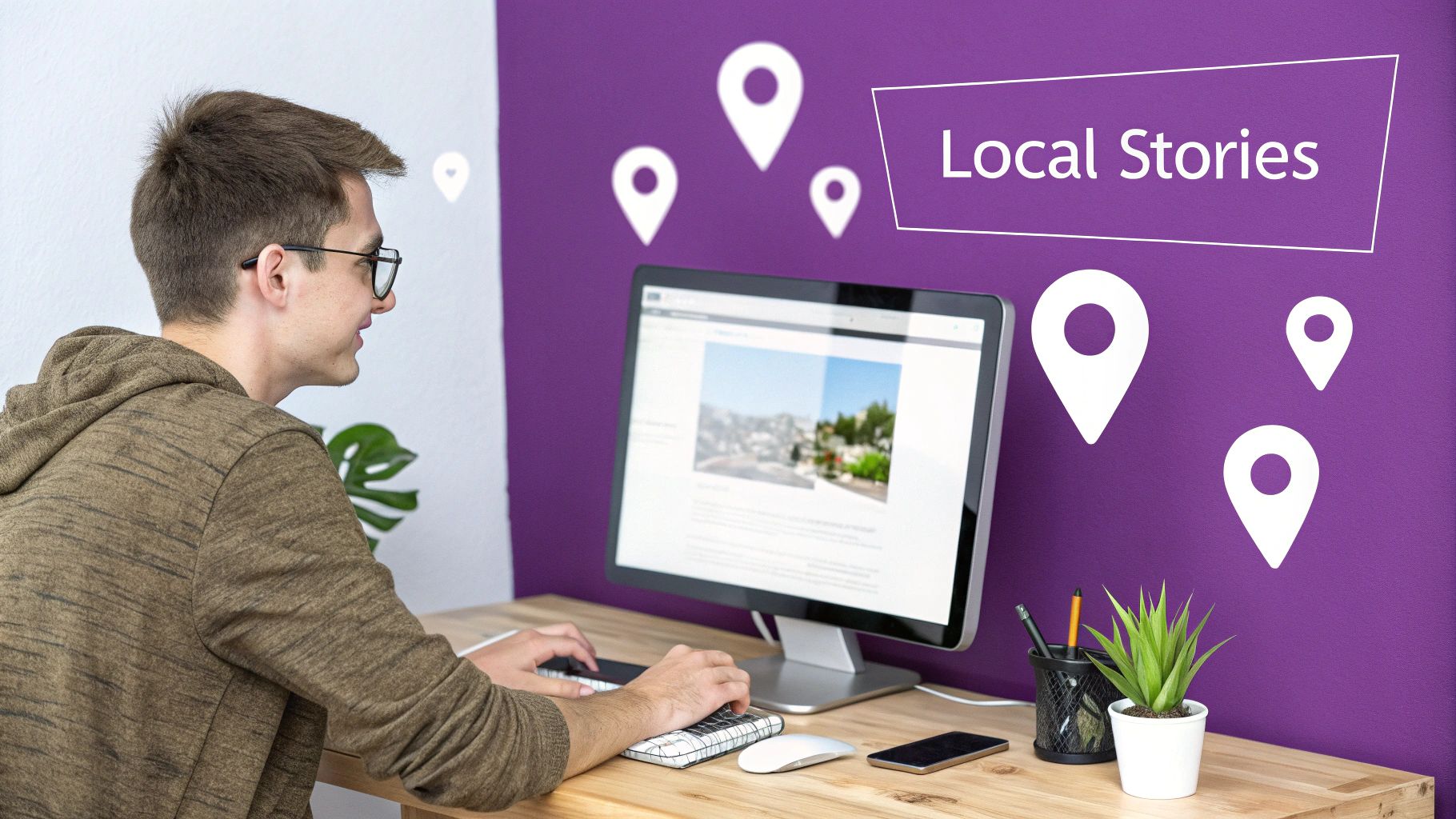
While foundational citations have their place, the most powerful local links are rarely found in directories. They’re earned. They come from genuine, real-world relationships and by actually showing up in your community. This is where you graduate from simple listings to building a brand that's truly part of the local fabric.
These kinds of links carry serious weight with Google because they’re authentic endorsements. They show that your business isn’t just in a town; it’s a vital part of it. A link from a local charity you support or a school team you sponsor is a digital thumbs-up reflecting a real connection. That’s pure gold for local SEO.
This whole approach turns link building from a dry, technical task into a meaningful business development activity. It’s about creating partnerships and stories that local news outlets, bloggers, and organisations will genuinely want to talk about.
Sponsor a Local Team or Event
One of the most straightforward ways to get involved is through local sponsorships. Let's be honest, almost every town and city in the UK has grassroots sports teams, school fairs, or charity fun runs that need support from local businesses.
Sponsoring one of these is a fantastic way to land a high-quality backlink. Most organisations will proudly feature their sponsors on their website, often with a direct link back to your homepage. Think about it: a Manchester-based accountancy firm could sponsor a local youth football club and get a link from the club’s official website in return.
It’s a classic win-win. The club gets much-needed funding, and your business gets:
- A highly relevant local backlink.
- Positive brand association within the community.
- Offline visibility on banners, kits, or event programmes.
Host a Free Workshop or Community Event
Nothing builds authority like sharing what you know. By positioning your business as a local expert and offering your knowledge for free, you build incredible trust and give other local groups a natural reason to link to you.
Imagine a local solicitor hosting a free workshop on will writing for residents. Or a digital marketing agency in Bristol running a session on social media for fellow small business owners.
When you host an event, you create a hub of activity. Local event calendars, community forums, and bloggers are always looking for fresh content. By creating an event page on your site, you give them a specific URL to point to when they share the details.
Expert Tip: Team up with another non-competing local business to co-host an event. This instantly doubles your promotional reach and creates cross-linking opportunities, as both of you will be promoting the event on your websites and social channels.
Partner with a Local Charity or Non-Profit
Working with a local charity is another brilliant way to generate goodwill and earn valuable links. This goes way beyond just cutting a cheque. You could organise a fundraising drive, offer your services pro bono, or even use your shop as a collection point for a food bank.
For instance, a cafe in Brighton could partner with a local homeless shelter for a "buy one, give one" coffee campaign. An initiative like that is genuinely newsworthy. It gives the charity a compelling reason to link to you from their partners page and gives local news outlets a great story to cover.
These partnerships show you’re committed to the community, building a level of brand loyalty that advertising just can't buy. If you want to take this even further, learning how to build an online community that thrives can seriously amplify these real-world efforts online.
Offer Scholarships or Student Discounts
Connecting with local educational institutions can unlock some of the most authoritative links out there. Universities, colleges, and even local schools often have websites with very high domain authority.
A practical way to do this is by offering a small scholarship. A dental practice in Leeds, for example, could offer an annual £500 scholarship to a local sixth-form student pursuing a career in healthcare. The school or college will almost certainly list this opportunity on their website, complete with a link back to your application page.
Similarly, offering a student discount can get you listed on university or student union websites in their "local discounts" section. It's a simple and effective way to earn a trusted link. These strategies require a small investment, but they pay off massively in both SEO value and community standing. Our own local SEO guide for ranking higher in Cambridgeshire shows just how pivotal these local connections are for visibility.
Creating Local Content That Attracts Links
While getting involved in your community is a hands-on way to build links, your website is where the real magic happens. This is where you can create content that works for you 24/7, attracting links passively. The idea is to stop chasing links and start earning them by becoming the go-to local resource.
We're talking about creating content so genuinely useful that local bloggers, journalists, and other businesses can't help but share it. This type of content is often called a linkable asset. Forget generic blog posts; a linkable asset is a definitive guide, a data-backed report, or a handy tool that serves your local community. It gives people a real, compelling reason to link back to your site.
Developing Your Linkable Asset Ideas
The best linkable assets come from thinking like a local. What do people in your area actually need to know? What questions are they asking that you, with your on-the-ground expertise, are perfectly placed to answer?
Think about it. A Bristol-based estate agent could put together a data-rich report on the ‘Best Commuter Villages Near Bristol’. They could dig into train times, analyse school ratings, and break down property prices. Suddenly, they've created the ultimate guide for anyone thinking of moving to the area.
Or what about a Scottish distillery in Edinburgh? They could publish ‘The Ultimate Guide to Independent Pubs in Edinburgh’, complete with interviews with the owners, great photos, and a custom map. That's exactly the kind of high-value content that local tourism blogs and lifestyle magazines are desperate for.
Here are a few more ideas to get the wheels turning:
- An accountant could build an interactive calculator for small business rates in their specific council area.
- A vet in Cornwall could publish a guide to the 'Top 10 Dog-Friendly Beaches and Cafes in Cornwall'.
- A Cambridge bike shop could map out all the safest cycling routes in and around the city.
The Power of Local Data and Surveys
One of the most powerful ways to get people talking—and linking—is to publish original local data. Journalists and bloggers absolutely love statistics because they add weight and credibility to their stories. You don't need a massive budget for this, either. A simple survey of your customers or a bit of digging into publicly available local data can go a long way.
Imagine a local coffee shop surveys 200 customers about their favourite local parks. They could publish the results as 'The Locals' Choice: The Top 5 Parks in Sheffield'. Just like that, they've created an original, newsworthy piece of content that local news outlets and community forums would find fascinating.
Leveraging Local Digital PR
Of course, creating a brilliant piece of content is only half the battle. You can't just hit publish and hope for the best. This is where local digital PR comes in—proactively reaching out to local journalists, bloggers, and website owners to show them your amazing new resource.
Success here comes down to finding the right people and writing a pitch they'll actually open. The best local SEO tools can help you pinpoint these opportunities.
Key Insight: Local journalists are drowning in emails. They get hundreds of pitches a day. Your message has to be short, direct, and make it crystal clear why your content is valuable to their audience. Generic, copy-paste emails are deleted on sight.
Personalise your pitch. Mention a recent article they wrote and explain how your content adds to the conversation. Give them a clear link and even suggest a specific angle for their story. You're making their job easier, which massively boosts your chances of getting featured.
To really get your content out there, you could also look into a powerful content syndication strategy, which can amplify its reach and increase the odds of it earning valuable backlinks from a much wider audience.
Measuring Your Local Link Building ROI
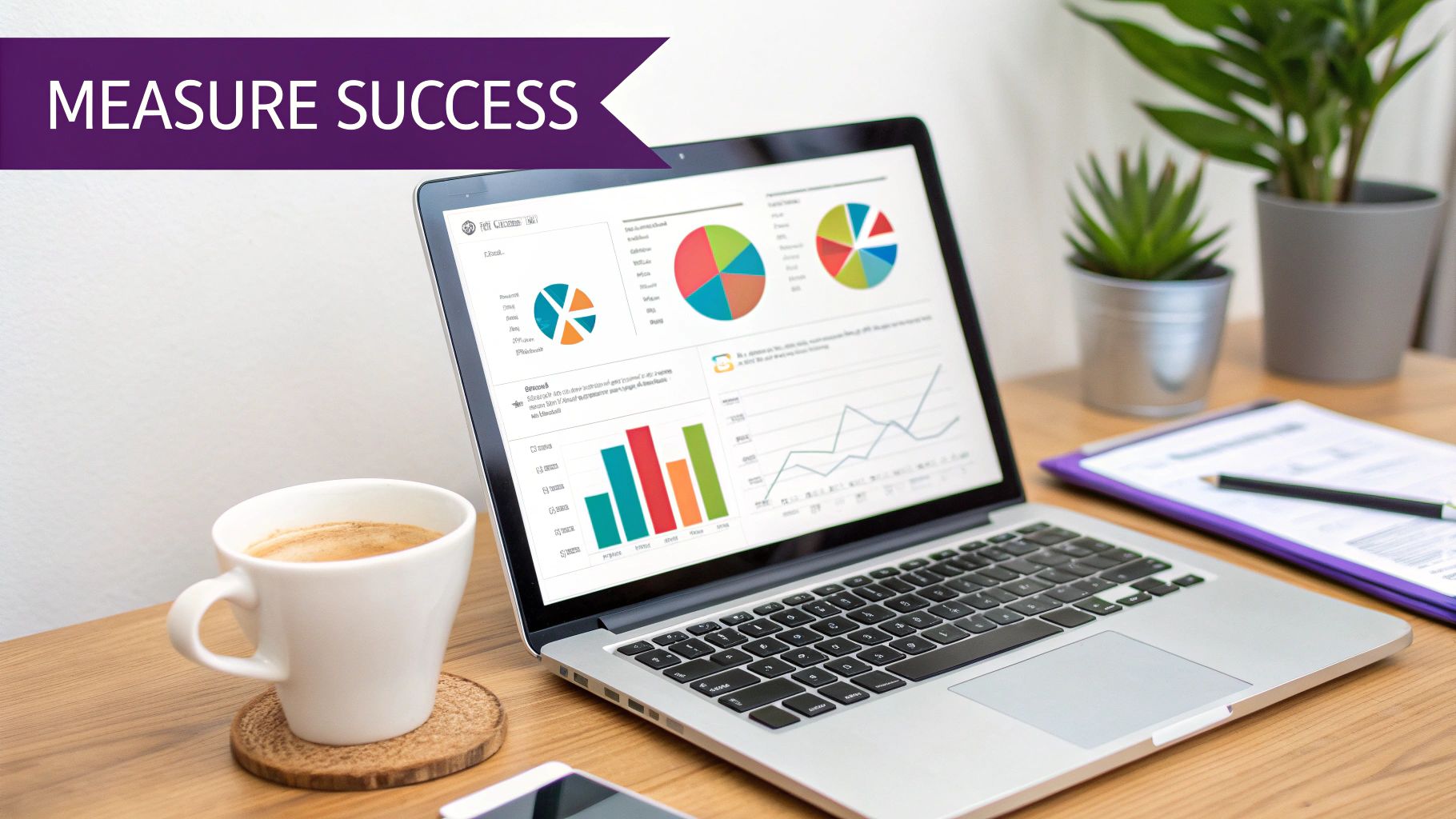
Pouring time and money into link building without tracking what comes back is like driving with your eyes closed. You need to know if your efforts are actually moving the needle. It’s not about just counting new backlinks; it’s about focusing on the Key Performance Indicators (KPIs) that directly impact your bottom line.
Justifying the spend, whether you're using a citation service or partnering with a local SEO agency, always comes down to proving the return on investment. This is how you make smarter decisions and show that link building is more than a marketing expense—it's a genuine driver of growth.
Setting Realistic Budget Expectations
Before you can measure ROI, you need a handle on what a realistic budget even looks like in the UK market. Link building is increasingly seen as a vital investment, not just a nice-to-have.
Recent research shows that 47% of UK link builders are spending over £600 a month, and 14% are investing more than £1,500. This tells us there's a growing realisation that quality link acquisition is essential for climbing the rankings. Even more telling is that 61% of professionals expect their budgets to go up, which signals that link building is viewed as a high-return activity. You can see the full breakdown in the 2025 link building survey.
This investment covers everything from outreach and guest posting to digital PR. Understanding these figures helps you set a sensible budget that matches your goals and the competitive reality of your local area.
Key Performance Indicators to Track
It's time to forget the vanity metrics. The real value of your local link building shows up in tangible business results. Ditch the obsession with Domain Authority scores and focus on these critical KPIs instead.
-
Keyword Ranking Improvements: Are you climbing the ranks for your most important local search terms? Tracking your position for phrases like ‘electrician in Sheffield’ or ‘best coffee in Bath’ is a direct measure of your success. A steady upward trend for these money-making keywords is a clear sign your links are doing their job.
-
Google Business Profile Interactions: A well-executed local link building campaign should absolutely boost your visibility in the Local Pack and on Google Maps. This leads to more real-world actions from potential customers. Keep an eye on the 'Performance' tab in your GBP dashboard for increases in:
- Calls: The number of people phoning you directly from your profile.
- Website Clicks: Users who click through to your site for more information.
- Direction Requests: People asking Google Maps to guide them straight to your door.
-
Growth in Local Organic Traffic: Jump into Google Analytics and filter your traffic by location. Are you seeing more visitors from your specific town, city, or county? This is solid proof that you’re attracting a geographically relevant audience—the people most likely to actually become customers.
Pro Tip: Make sure you set up conversion tracking in Google Analytics. This lets you see exactly how many of those local visitors are completing valuable actions, like filling out a contact form or making a purchase. It’s the clearest way to connect your link building efforts directly to revenue.
Tying It All Together
Measuring ROI isn’t a one-off task; it’s an ongoing process of connecting the dots. You secure a great link from a local blogger (your action), which leads to improved rankings for a key term (a KPI), resulting in more calls from your Google Business Profile (a business outcome).
By tracking these specific metrics, you can clearly demonstrate the value of your investment. This data-driven approach not only justifies your budget but also helps you refine your strategy over time, doubling down on the tactics that deliver the best results for your business. To see how all these pieces fit into a broader strategy, it’s worth checking out a complete guide on small business local SEO.
Of course. Here is the rewritten section, crafted to sound completely human-written, following all the provided guidelines and examples.
Your Local Link Building Questions Answered
Even with a solid plan, a few questions always pop up. It's completely normal. Let's tackle some of the most common ones we hear from local business owners to clear up any confusion and get you moving forward.
How Long Does Local Link Building Take to Show Results?
This is the million-pound question, isn't it? The honest answer is that it’s a marathon, not a sprint.
You can often see some early wins within a few weeks or a couple of months. Things like cleaning up your Google Business Profile and building out key citations can give you a nice little bump in the local map packs. But for the really impactful stuff—the links you earn from great content or local PR—you need to be more patient.
For these bigger efforts, you’re realistically looking at the 3-6 month mark to see significant movement. The key is consistency. Google needs time to find your new links, figure out what they’re worth, and then shuffle the rankings accordingly. A steady, ongoing approach is what wins in the long run.
Is It Ever Safe to Buy Backlinks for My Local Business?
Let me be blunt: no. Never. Buying backlinks is a massive red flag for Google and goes directly against their webmaster guidelines. It’s a classic 'black-hat' SEO tactic that can do serious, lasting damage.
Think about it. These purchased links almost always come from dodgy, irrelevant websites, often called 'link farms', that offer zero real value. If you get caught—and you likely will—you could face a manual penalty from Google. That can completely wipe out your rankings, and it can take months, or even years, to recover.
Crucial Takeaway: Your energy is far better spent earning links, not buying them. The legitimate strategies we've talked about—creating genuinely useful local content, building real community relationships, and getting local press—are not only safer but infinitely more powerful.
What Is the Difference Between a Citation and a Backlink?
This is a great question, and it's a point of confusion for many. They are related, but they serve different functions in local SEO.
-
A citation is just a mention of your business's Name, Address, and Phone number (NAP) online. Think of directories like Yell.com. It doesn’t even need to be a clickable link. Citations are all about proving to Google that your business is legitimate and that your location and contact details are consistent.
-
A backlink, on the other hand, is a clickable link that sends someone from another website to yours. Backlinks are what pass authority, or 'link equity', to your site, which is a huge signal to Google that your website is credible and important.
Here’s the sweet spot: a listing on a quality local directory that includes a clickable link to your site acts as both a citation and a backlink. That’s the best of both worlds.
How Many Links Do I Need to Rank Locally?
There’s no magic number here. The answer depends entirely on your competition.
If you’re a florist in a small village, you might only need a handful of really good local links to get to the top. But if you're a solicitor in central London? You’re going to need a much more serious, ongoing link building campaign to even make a dent.
So, instead of chasing a specific number, shift your focus to quality and relevance. Your real goal is to build a stronger, more authoritative link profile than your top local competitors. Use SEO tools to see who is linking to them, and then figure out how you can earn those same links—or even better ones. It’s about being better, not just having more.
Ready to get your local search presence to the next level but not sure where to start? The team at Bare Digital offers a free, no-obligation SEO Health Check to pinpoint your biggest opportunities. Get your personalised activity plan today and see how our specialist SEO services can help you dominate your local market. Visit us at https://www.bare-digital.com to claim your free audit.

